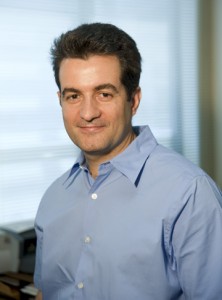Better Data Management, Lower Healthcare Costs
By Rachel Harrington
Today, people with chronic conditions like diabetes are benefitting from real-time monitoring devices like miniaturized implants, home monitoring equipment, and smartphone applications. Unfortunately, even though tracking a person’s symptoms and vitals has improved, hospitals and their medical teams are not ready to benefit from possessing so much personalized health data.
Boston University’s Professor Ioannis Paschalidis (ECE/SE)and Dr. William Adams (BMC) have teamed up with MIT’s Professor Dimitris Bertsimas to develop algorithms that can systematically process all patient data in hospital electronic medical records and personalized health records. These algorithms will be designed to classify patients based on the risk of developing an acute condition that would require hospitalization. Such information can then be used to drive preventive actions.

“What motivated us to start this particular project is the recognition that the US health care system is extremely inefficient as it is geared toward treating acute conditions,” said Paschalidis. “There are, we believe, tremendous opportunities for preventing the occurrence of these conditions and the expensive hospitalizations they cause.”
To support their work, the National Science Foundation (NSF) has awarded Paschalidis (PI), Adams (Co-PI), and Bertsimas (Co-PI) a five-year, nearly $2 million grant for the project.
By focusing on disease prevention and keeping patients out of the hospital, their work has the potential to improve a healthcare system that is often considered to be very expensive and highly inefficient.
“To that end, the meaningful use of electronic health records is seen as a key to improving efficiency,” the team wrote in their proposal.
The research will utilize Paschalidis’s expertise in data models, optimization and decision theory, but it is truly a collaborative project. Adams, for example, will work with physicians to get feedback on the outcome of the algorithms.
“The main challenge is going to be the adoption of the techniques we develop by physicians in particular and the healthcare system in general,” Paschalidis said. “Dr. Adams will serve as our ambassador to that community.”
Adams said that the Boston Medical Center has spent more than ten years “developing a robust and rich clinical informatics infrastructure for clinical care and research” and welcomes this new partnership.
“Translational science involves collaborative efforts between traditionally independent scientists,” Adams said. “This project is innovative and important in that it brings together mathematicians, engineers, clinicians, and informaticians to better understand and improve healthcare.”
As healthcare costs increase, their research may prove not only to be timely but also life-changing and cost-effective.

